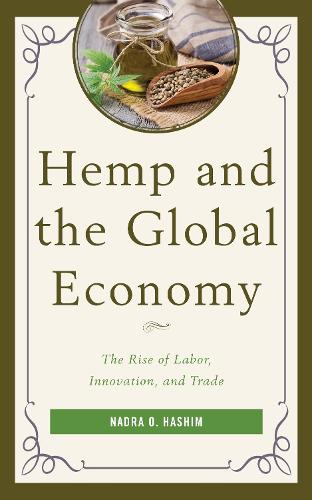
Hemp and the Global Economy: The Rise of Labor, Innovation, and Trade
(Hardback)
Available Formats
Publishing Details
Hemp and the Global Economy: The Rise of Labor, Innovation, and Trade
By (Author) Nadra O. Hashim
Bloomsbury Publishing PLC
Lexington Books
23rd October 2017
United States
Classifications
Professional and Scholarly
Non Fiction
History of the Americas
Local history
Political science and theory
Central / national / federal government policies
Political economy
338.17353
Physical Properties
Hardback
246
Width 157mm, Height 239mm, Spine 24mm
544g
Description
Hemp helped not only to define economic development in southern and border-states, it also played a crucial role in agricultural production in the Mid-Atlantic, as well as industrial development in the North-east. From the founding of the nation, the manufacture of American hemp helped monetize the US economy. US hemp producers also established a range modern labor practices, including the identification and training of skilled labor, the use of seasonal workers, and ultimately, the creation of a sliding scale of wages. This book chronicles this history, as well as the contemporary controversy obstructing the production of both industrial hemp and medical marijuana. The analysis concludes with a survey of current industrial hemp projects, including several promising adaptations - as a potential medicine, a bio-fuel, and most promisingly, a reliable source of clean computing fabrication.
Reviews
This book is a readable and important history of the uneven rise and fall of hemp farming and production in theUnited States.Hashim skillfully situates hemp in the larger political, economic, and labor worlds that determined its fate as both a viable crop forAmerican farmers and a marketable resource in the world economy. -- James C. Giesen, Mississippi State University
The approach this book takes and the quality of the work promises to provide a lasting contribution to the literature. Most books on this topic focus on hemp or marijuana, specific historical periods/analyses, or current debates centering on legalization for medical or recreational use (often focusing on one but not the other, i.e. medical or recreational use). Other works focus on hemps industrial applications alone. And, many focus on the moral panics associated with hemp as marijuana and its shift from a legal product to a banned drug. Few, if any, combine all of this and more in scope which this book accomplishes. -- John Asimakopoulos, Professor of Sociology, CUNY
Author Bio
Nadra Hashim is reviewer for the Journal of Agriculture, Food Systems, and Community Development.
